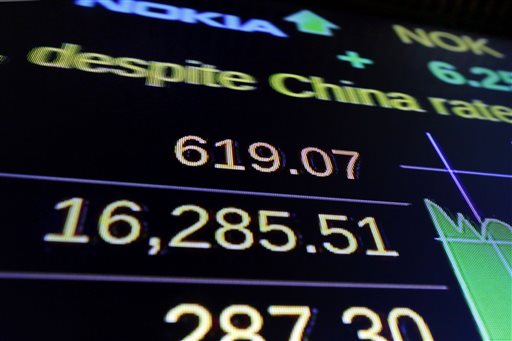Wall St. rallies but markets still gripped by China fears

A screen above the trading floor of the New York Stock Exchange shows the closing number for the Dow Jones industrial average, Wednesday, Aug. 26, 2015. U.S. stocks closed sharply higher, giving the stock market its best day in close to four years. AP PHOTO/RICHARD DREW
NEW YORK—US shares rallied strongly Wednesday after a top Federal Reserve official hinted the bank would not raise interest rates, but there was little sign that the global financial turbulence rooted in China’s market meltdown was over.
Even another rate cut by the People’s Bank of China did not stem worries that slowdown in the world’s second-largest economy could stall world growth.
Widespread concerns remained over whether authorities in Beijing were doing enough to calm the markets and sustain economic activity at the current level, despite the injection of hundreds of billions of yuan into markets to support stocks and the currency itself.
“If problems in China’s financial markets and real economy deepen, and the authorities fail to contain the situation, a full-blown financial and economic crash in China could ensue,” said Christophe Donay, chief strategist at Pictet Wealth Management.
“This is currently the biggest risk for the global economy and financial markets.”
The day saw mixed movements in major bourses—Shanghai fell another 1.27 percent and European shares, represented by the Eurostoxx 50 blue chip index, lost 1.47 percent while Tokyo added 3.2 percent.
But Wall Street broke free of a six-day losing streak.
Helped by a 5.7 percent gain from Apple, the S&P 500 closed with a 3.90 percent gain; the Dow added 3.95 percent, and the Nasdaq Composite was up a heady 4.24 percent.
Even with the US gains, S&P-Dow Jones Indices said $3.45 trillion in value had been wiped from shares around the world over seven days in the China-driven rout.
Fed, ECB vigilant
The US rebound came after William Dudley, the head of the New York branch of the Fed and one of the most influential members of its monetary policy board, said the reasons for moving to a long-awaited rate hike in September had weakened.
“The slowdown in China could lead… to a slower global growth rate and less demand for the US economy,” Dudley said.
“We’re concerned about the outlook, how is the economy going to perform in the future… And there, international developments and financial market developments do have relevance because they can impinge and affect the economic outlook.”
While Dudley’s comments do not preclude the US central bank from embarking on its first rate increase in nine years in the coming meeting—he stressed that the world’s largest economy remained in good shape—analysts saw it as a sign that the Fed would weigh the global turbulence in making the decision.
Analysts also pointed to comments by European Central Bank executive board member Peter Praet on Wednesday that the ECB was prepared to expand its quantitative easing stimulus program if China’s slowdown further dampens inflation.
For the markets, however, Capital Economics said the worst may be over.
“Looking ahead, we… suspect that investors will be less worried about China in due course, as it becomes apparent that her economy is not collapsing,” they wrote in a note.
China rate cuts enough?
But worries remained over how deep China’s downturn will be and over the effectiveness of Beijing’s interventions.
ANZ economist Liu Li-Gang told AFP that the two trillion yuan ($312 billion) the government is estimated to have spent to support the market had gone “down the drain.”
The central bank needs to “make sure the money can go to the real economy,” he said.
After the Shanghai stock index slid 22 percent over four days, the People’s Bank of China on Tuesday cut lending and deposit rates by 0.25 percentage points each, and banks’ minimum reserve levels by 0.50 percentage points.
That took its lending rate to a record low 4.60 percent, which should make it easier for individuals, companies and local governments to borrow—essential as China tries to wean its economy off exports and investment and move towards a consumer-driven model.
But four previous cuts since November have failed to add any spark, and analysts said the impact of the latest adjustments would be limited without structural changes to accompany them.
A Chinese slowdown threatens world growth because the Asian powerhouse represents around 15 percent of global economic activity, and is a top consumer of many commodities.
It could also undermine efforts by the Fed and ECB to shore up growth and battle deflation in their respective economies.—John Biers














